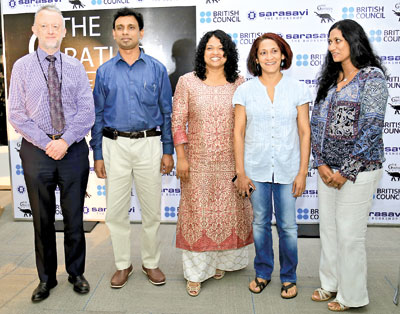An evening of ‘Memory Loss’, ‘Short Eats’, ‘Stories’ and ‘Borrowed Dust’
Judging Panel Chair Prof. Sasanka Perera calls for separate awards for poetry, novels, short stories, biographies, memoirs etc.

L- r:British Council’s Country Director Keith Davies, Chandana Dissanayake (Judge), Ruhanie Perera (Judge), Vivimarie VanderPoorten (shortlisted), Charulatha Abeysekara Thewarathanthri (shortlisted) Shehan, Jean and Rizvina were not present at the event. Pic by Anurada Bandara
Last Monday, readers and writers thronged to a hall filled with books for an event revolving around books to hear the shortlist announcement for the Gratiaen Prize 2016. The shortlisted authors for the 2016 prize are Jean Arasanayagam for Introspection, a collection of published poems; Rizvina Morseth de Alwis’s novel – manuscript The Memory of Loss; Shehan Karunatilaka for Short Eats – a collection of unpublished short stories; Charulatha Abeysekara Thewarathanthri’s Stories, an unpublished novel, and VivimarieVanderPoorten’s Borrowed Dust, a collection of unpublished poetry.
The judges for the Gratiaen Prize 2016 are:Prof. Sasanka Perera (Chair of the judging panel), cultural anthropologist, academic and bilingual cultural commentator; Chandana Dissanayake, academic and creative writer; and Ruhanie Perera, performer, performance maker and lecturer.
In a pre-recorded video shown at the event, Chair of the Judging Panel, Prof. Perera reflected on the experiences of the judging panel. Currently based in New Delhi, India, Prof.Perera noted that the panel looked at each entry through individual merits of each form and category to come up with the shortlist. While acknowledging that genres of writing resist easy categorization, he echoed comments made by past panels in previous years, reflecting on the challenges of evaluating multiple categories of writing vying for one prize.
“To consider such a wide variety of writing as we have done, and many other judges before us, under the banner of creative writing in English, for a single award is extremely difficult – to put it very mildly. As the Gratiaen Trust begins to celebrate its 25th anniversary, it might be a good idea to explore the possibilities of diversifying its award scheme to more specifically include separate awards for poetry, novels, short stories, biographies, memoirs and mixed writing and so on, on the same lines that a separate award has already been distributed for translations and that is the H.A.I. Goonetileke award – so that a model already exists,” noted Prof. Perera.
Commenting on the shortlisted works, the panel of judges praised Jean Arasanayagam’s ‘Introspection’ for “its commitment to journeying into the self, interiority and the intimacy of thought and memory”. Arasanayagam’s nuanced play with punctuation, exploration of landscape as place and location and episodic phrasing in her poetry were also highlighted.
Rizwina Morseth de Alwis’s memorable characterization, subtle presentation of a multicultural ethos and imaginative plot build-up earned her place in the shortlist for her manuscript The Memory of Loss. The novel deals with themes of love, loss and the fraying of family ties and is set in the suburbs of Colombo from the 70s to the millennium.
The judges praised Shehan Karunatilaka’s rich terrain of characters, location and socio politic and timely engagement with the form of short story. The judges noted that Karunatilaka’s writing “embraces the ugliness of human vulnerability without apology” while also “forging a language of short fiction that is both relevant and meaningful because the way we engage and express has evolved dramatically”. In a humorous speech delivered by a friend, the author noted that the collection of 13 short stories was a result of procrastination and attempts to finish a second book over the years.
Stories by Charulatha Abeysekara Thewarathanthri was lauded for its colourful characters, “build-up of a storyline that addresses the intimate and the larger-than-personal” and “for bringing back poetry into fiction through imaginative use of language”. Stories, the author explained, was her second attempt at writing and took more than three years to finish.
The judges commented on Vivimarie VanderPoorten’s gifts of metaphor, poetic sensibility and “audacious blurring of the boundaries between public and private, and its relentless exploration of ways of seeing and subversion” in her collection of poetry. Borrowed Dust is Vivimarie’s first collection of poems in six years and deals with love, loss and issues such as mental health and violence against women.
Since its inception, the shortlist announcement has been hosted by the British Council and once again, the event was held at the British Council Library this year. The submission of the entries to the prize was facilitated by MARGA Institute.
The prize was founded by Michael Ondaatje in 1992 and is named after his mother, Doris Gratiaen. The award recognizes and rewards creative writing in English by a Sri Lankan citizen resident in Sri Lanka and comes with prize money of Rs. 200,000.Creative writing eligible for the prize include novels, collections of short stories, poetry, drama as well as autobiography, biography and memoirs, both published and or in manuscript form.
This edition of the Gratiaen Prize is the second to be awarded under the new partnership between the Gratiaen Trust and Sarasavi Bookshop. The winner of the Gratiaen Prize 2016 will be announced on May 27, 2017.


